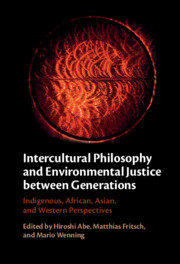 Intercultural Philosophy and Environmental Justice between Generations
Intercultural Philosophy and Environmental Justice between Generations from Part III - Humanity Facing the Near Environmental Future
Published online by Cambridge University Press: 14 March 2024
Humanity is currently in the grip of deep institutional denial concerning the adequacy of its institutions for dealing with serious intergenerational challenges, such as global climate change. In response, we should call for a global constitutional convention focused on developing new institutions to protect future generations and further their interests. This chapter presents ten initial guidelines for how to construct such a global constitutional convention. Although each follows as a fairly modest and natural inference (a ‘baby step’) from the purposes of the convention itself, the implications stand in sharp contrast to the status quo and to most conventional discussions of reform. The guidelines are, thus, both modest and radical. As a result, the global constitutional convention is, perhaps, just the kind of realistic utopia that we need.
To save this book to your Kindle, first ensure no-reply@cambridge.org is added to your Approved Personal Document E-mail List under your Personal Document Settings on the Manage Your Content and Devices page of your Amazon account. Then enter the ‘name’ part of your Kindle email address below. Find out more about saving to your Kindle.
Note you can select to save to either the @free.kindle.com or @kindle.com variations. ‘@free.kindle.com’ emails are free but can only be saved to your device when it is connected to wi-fi. ‘@kindle.com’ emails can be delivered even when you are not connected to wi-fi, but note that service fees apply.
Find out more about the Kindle Personal Document Service.
To save content items to your account, please confirm that you agree to abide by our usage policies. If this is the first time you use this feature, you will be asked to authorise Cambridge Core to connect with your account. Find out more about saving content to Dropbox.
To save content items to your account, please confirm that you agree to abide by our usage policies. If this is the first time you use this feature, you will be asked to authorise Cambridge Core to connect with your account. Find out more about saving content to Google Drive.